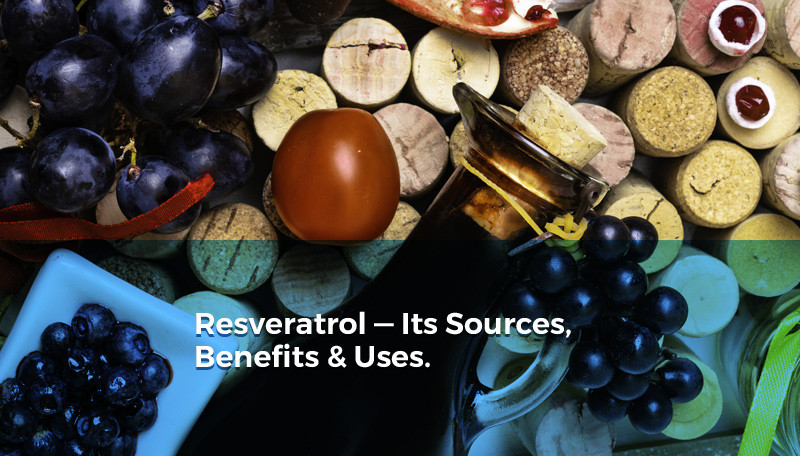We all know all too well that drinking and driving don't mix, that there's not much good to be gained by drinking too much alcohol. Drinking a moderate amount of red wine, though, can apparently be a boon to our health, starting with how it seems able to protect brain function and lower blood pressure – and that isn't all. The key ingredient to red wine's purported health benefits is a substance known as resveratrol, a plant compound that serves as an antioxidant, per healthline.com. To those of you who don't drink or are too young to be imbibing alcohol legally, you are in luck when it comes to getting your hands – or at least your digestive system and bloodstream – on resveratrol. It can also be found in some berries, such as blueberries, as well as in peanuts and, as you might have guessed, grapes, where the compound tends to be found mostly in the skins and seeds (as is the case with the resveratrol-laced berries). Per healthline.com, these parts of the grapes are included in the fermentation of red wine, which explains its lofty concentration of resveratrol. Other foods found to contain resveratrol include pistachios, raw cacao, and, yummy, dark chocolate. Things are looking up, huh?
What Makes Resveratrol So Special?
Resveratrol belongs to a class of antioxidants known as polyphenols, which researchers believe can help protect blood vessel linings in your heart, per mayoclinic.org. Also, resveratrol consumption has been associated with a reduced risk of inflammation and blood clotting, with both conditions possible precursors of heart disease. Part of the apparent link between consumption of red wine and a lower risk of heart attacks in those who drink the red vino aren't completely understood, although it seems that the antioxidants might boost HDL (good) cholesterol and ward off the buildup of bad cholesterol. An important note to keep in mind: too much alcohol in your body can produce damaging effects, which is why health professionals praising the benefits of red wine and resveratrol are quick to warn against anything more than moderate consumption – which can generally be considered as something less than daily drinking of red wine and steering clear of getting tipsy, or worse, Take it easy, in other words, and live longer.Resveratrol's Possible Health Benefits
- Reduced risk of heart disease. We've already covered much of that above, such as how resveratrol may lower blood pressure. A 2015 review, cited per healthline.com, says the polyphenol might help reduce the pressure exerted on artery walls each time the heart beats, thus reducing systolic blood pressure (the number on top). Also, as explained by resveratrol expert and book author Dr. Joseph Maroon, per a 2013 CBS News report paraphrasing Maroon, resveratrol has the ability to dilate blood vessels, increase nitric oxide and block the stickiness of platelets, (making) it is a good compound to target heart problems.
- Positive effect on blood fats. This finding grew out of a 2016 study done on mice that were given a high-protein, high-polyunsaturated fat diet simultaneous to resveratrol supplements. The results included a reduction in total cholesterol levels and body weight of the mice, while increasing HDL (good) cholesterol levels. What happens here, per healthline.com, is that resveratrol's effect on cholesterol levels is related to how it decreases the influence of an enzyme that controls cholesterol production.
- Thwart development of Alzheimer's disease. Resveratrol's antioxidant properties can help clear out the neural pathways and diminish oxidative stress effects, thus apparently helping to preserve mental health and memory, per organicfacts.net.
- Promote weight loss. Resveratrol can possibly have a role in weight loss, especially with people dealing with obesity, by enhancing your body's metabolism and assisting in the detoxification of your body, per organicfacts.net.
- Anti-aging. Here's a potential health benefit sure to get a lot of attention in this day and age of youthfulness. Because resveratrol is an antioxidant, it can help erase or at least reduce wrinkles, age spots, and blemishes, among other signs of aging. Heather Hausenblas, an associate professor as of 2013 at the University of Florida's College of Health and Human Performance, cited to CBS News a study of human subjects who took resveratrol for 60 days and showed skin that was more moist, less rough, had better elasticity, and a decrease in age spots.
- Helpful for diabetics. Animal studies using resveratrol demonstrated increased insulin sensitivity and the avoidance of some complications associated with diabetes. One explanation for this, per healthline.com, is that resveratrol might be able to inhibit a certain enzyme that can convert glucose into sorbitol, a sugar alcohol. It can also help diabetics by protecting against oxidative stress, reducing inflammation and activating AMPK, a protein that assists the body in metabolizing glucose and keeping blood sugar levels low.
- Ease joint pain. Taken as a supplement, per healthline.com, resveratrol has been shown to aid in protecting against cartilage deterioration, which can produce joint pain, one of the key symptoms of arthritis.

